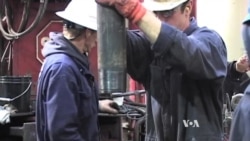Oil rig workers, known as roughnecks, face unemployment as oil prices fall, but the impact is greater in regions like Alaska and North Dakota, where production costs are higher than they are in the Eagle Ford shale area of south-central Texas.
Business has even picked up at Rooster Safety in Pleasanton, Texas, where roughnecks buy gloves, helmets and protective gear.
Store owner James Strange said he'd been getting orders from company purchasing agents who were content with paying more to established suppliers when oil prices were high.
“Now that oil prices are dropping and people want to watch their budgets, they are willing to take an extra 30 minutes to create an account with us so that they can start purchasing and save some money,” he said.
By keeping costs low, some projects in south-central Texas can remain profitable as long as the price of oil stays above $40 a barrel.
Economist Adam Perdue at the University of Houston's Institute for Regional Forecasting, who studies the impact of the slowdown on Texas, said that “exploration and production budgets are being cut anywhere from 10 to 50 percent, with most of them being about 30 percent.”
He said Houston's economy, which experienced 5 percent growth in recent years, would be affected by the lower spending.
“We are predicting there will be 20,000 fewer jobs than there would have been otherwise," Perdue said. "So, we are still predicting growth in the Houston area. It is just going to slow down to a more reasonable rate of just under 2 percent.”
The slowdown will also affect companies that make pipes and fittings for oil exploration and production, as well as trucking companies that supply sand and chemicals for hydraulic fracturing and many other small businesses that serve the energy industry.
But low oil prices are a stimulus to chemical producers that use hydrocarbons to make everything from solvents to fertilizer and plastics. Perdue said new chemical plant construction near Houston would keep many skilled workers employed.
“A lot of these roughnecks that are going to lose their jobs out there in the field are going to be able to come home and get a welding job or a construction job,” he said.
Perdue said oil company analysts see prices rising again in six months or so as the market glut from expanded production decreases.
But, he said, if those assumptions are wrong and oil prices continue to fall, the impact on Houston and Texas in general will be much worse.











